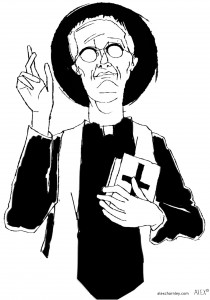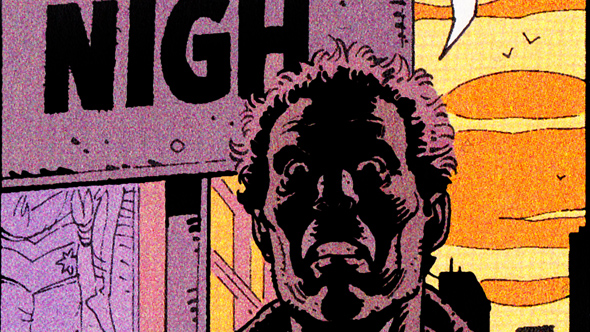One fine morning in the 90s, I awoke to the noise of a chainsaw outside, felling the trio of plum trees which stood taller than the council flats around them. The toilets needed replacing, explained a man in overalls. The masonry needed storing, there, in the only suitable space in the borough, so they needed to clear it. Their work was the final link in a chain of necessity that began, apparently, in my toilet (which did its job to my satisfaction, but I make modest demands on my plumbing).
The trees were weeks away from ripening, but he wouldn’t personally miss the fruit raining down every autumn. His dreadlocks wrong-footed me; surely a reggae-fiend couldn’t be responsible, but then who was? Does a councillor consider how common wealth binds a community together? Does a town planner reflect on the value of a jar of homemade jam, given by a widow to her neighbour?
“It is a sin to cut down fruit-bearing trees,” I explained. “Even in times of war.”
Sadly he did not down tools at the word of the Almighty. The trees were chipped, porta-cabins went up, then fences and “no-climbing” signs. When they finally came down, saplings were planted, and continue to be planted, because some poor soul unschooled in Judeo-Christian lore always snaps them. Kids round here climb fences where they once climbed trees, and wherever they explore they trespass. The sweet things to eat are the fruits of commerce, and picking them is shoplifting.
Fifteen years on and my own children are more inspired by daisies on the treeless lawn than the upgraded toilet, so imagine my horror when I heard the buzz of the chainsaw again. The estate’s final square metres of wilderness were being cut to knee height.
“What the hell are you doing?” I shouted.
“What about the poor birds?” came the labourer’s lamentation, and again I was wrong-footed. The Saxons called this place Fullenhame, meaning “habitation of birds”, and Fulham council was evicting some of its last birds, to neaten it up a touch, or maybe to justify its budget.
“They told me to do it!” protested the conflicted bailiff.
“Didn’t cut any ice at Nuremberg!” I shouted, knowing that he too was bound a chain of necessity, of bills to pay and mouths to feed. And who was I to point a finger? To my eternal shame, and to the eternal detriment of my environment, I wasn’t prepared to sack off work that day and D-lock myself to a tree. And I confess the idolatry in my decision. The weakness of my bended knee empowers a vampiric master, which feeds on the happiness of my children. My taxes are an offering I willingly give. As it is written, regarding idolatry:
“Thou shalt not bow down thyself to them, nor serve them: for I the Lord thy God am a jealous God, visiting the iniquity of the fathers upon the children unto the third and fourth generation of them that hate me.” (Exd 20:5)
I bow down. The labourer serves, knowing his sin as he does. Our children are impoverished, and our children’s children. Generations of trees gave countless tons of fruit as the commons shrank to a thicket, and will give no more. Infinities of poverty or wealth stretch out from every decision concerning life.
With infinity weighing on my mind I returned to scripture, hoping to find some profound ecology amidst the fruit trees, but this line falls in one of the most brutal passages of Deuteronomy, glorifying empire and massacre. The omnipresent encompasses all experience and morality, and is candid about it: “I form the light, and create darkness: I make peace, and create evil” (Isa 45:7). We who are made in God’s image call upon His full range, but even in the throes of their most bloodthirsty urges, the Israelites knew not to do something so stupid as to destroy a fruit tree.
That same day, the bombs began to fall on Gaza, splintering worlds into infinities of hell, burning into flesh the potential for endless retribution. IDF bulldozers have felled hundreds of thousands of olive trees in the occupied territories, but Zionism was never a religious philosophy. Its architects were atheists, though their writings equal Deuteronomy in their casual racism. The Talmud forbids Jews from forming a state, and in the Bible the land of Israel is given after the Messiah comes, not before. Zionism was opposed at its inception, as today, by many orthodox Jews. Despite the fact that Jews were far more persecuted in Christendom than in Muslim lands, the only place they are killed today is in Israel itself, despite its US-backed war machine and nuclear arsenal.
The Lord gives “statutes that were not good, and judgments whereby they should not live” (Exd 20:25). Every single prophet stood up to Him when His wrath went too far, “and the Lord repented of the evil which he thought to do” (Exd 32:14). The exception is Noah, whose weakness resulted in a global cataclysm. If common wealth is ours to enjoy, it is ours to defend, whether a tree or a peace. We are all bound by chains of necessity, but if you and I do not throw them off, then who will? And what world will remain if we delay?
Morality, in the final analysis, is what we decide, and if God can be held to account, so can the state. If it will be unaccountable, let us be ungovernable. Let us not rest until this idol is smashed and ground into dust, and let our legacy be a gift of freedom, not an infinity of hell for the generations to follow.
By Reverend Nemu










